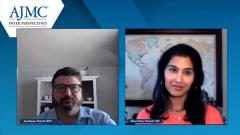
The Impact of Early Effective Treatment in MDD
Early effective treatment strategies can have a significant impact on long-term effects for patients with MDD.
Episodes in this series

Mona Chitre, PharmD, CGP: Because MDD [major depressive disorder] is a symptomatic disease with such an impact on quality of life, the goal is to have early, effective treatment as quickly as possible. That enables the patient to feel improvement from the condition and supports treatment adherence. Treatment is often customized and specific for the patient, but if we can have early, effective treatment, there’s a whole host of downstream improvements around overall improvement of health that our members will benefit from. That’s always a goal in treating this condition.
Jay Weaver, PharmD, MPH: One of the main contributors to outcomes is how quickly we begin to see a response in someone. As we talked about before, these medications have a downstream effect on neurotransmitters both up- and downregulating different parts of that process. It can take time to achieve. During that time, as the time wears on and people aren’t getting relief, they begin to withdraw more. They’re less committed to care. We lose them to follow-up. There are all sorts of things that happen over that time, so a key contributor is finding the effective therapy fast or, if it’s not going to work, moving them quickly onto another therapy that could work for them. For a multitude of reasons, that’s the key driver to be able to move forward with these therapies.
Transcript edited for clarity.
Newsletter
Stay ahead of policy, cost, and value—subscribe to AJMC for expert insights at the intersection of clinical care and health economics.











